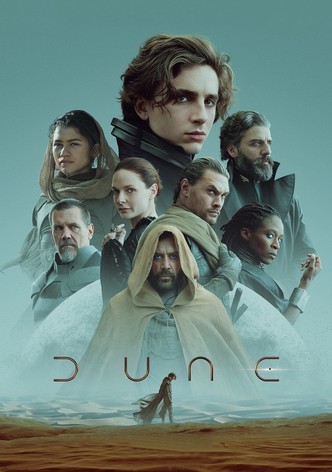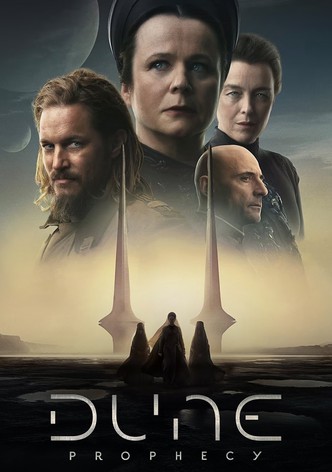Denis Villeneuve’s Dune and Dune: Part 2 may have brought Frank Herbert’s sci-fi novels into the spotlight, but it’s not the first time that the epic story has been adapted for the screen.
From David Lynch’s ill-received adaptation to Frank Herbert’s three part mini-series, Dune’s cinematic legacy is as vast and mysterious as the sands of Arrakis itself. If you’re looking for the best way to watch all the Dune movies and TV shows in order, then this guide has you covered.
The Best Way To Watch All Dune Movies and TV Shows In Order
You could watch all the Dune movies and TV shows in chronological order (starting with Dune: Prophecy and following it up with Dune and Dune: Part Two consecutively), but that’s not the best way to experience the story. The ideal approach to the Dune franchise is to start with Denis Villeneuve’s films and upcoming TV series, then follow them in release order.
Villeneuve’s adaptations are the most visually breathtaking and narratively faithful, delivering the true grandeur and depth of Frank Herbert’s sci-fi universe making them the most worthwhile and definitive interpretation of the novel to date. It’s also the only ongoing adaptation of Dune, with Villeneuve’s universe continuing to expand through planned sequels making it the most thorough and accessible entry point into Herbert’s world. Here’s a breakdown of all of Villeneuve’s Dune movies and TV shows:
Dune (2021)
The first movie in Villeneuve’s series, Dune, kickstarts Paul Atreides’ journey as the prophesied heir to a powerful destiny. When his noble family takes control of the desert planet Arrakis, betrayal and war ensue, forcing Paul to embrace his fate among the Fremen.
Visually stunning and deeply atmospheric, Dune is a must watch for fans of sprawling sci-fi epics like Blade Runner 2049 and Star Wars, movies with political intrigue, and grand, character-driven storytelling. That said, those looking for a fast-paced, action-heavy blockbuster, or simple sci-fi, might find Dune’s deliberate pacing and dense lore too demanding.
Dune: Part Two (2024)
Dune: Part Two directly continues the storyline of Paul Atreides’ journey as he joins forces with Chani and the Fremen to avenge his family and fulfill his destiny. It’s bolder, more visually spectacular, and narratively ambitious than the first, deepening the stakes and expanding the grandeur of Arrakis.
It’s also a lot more action- and character-driven, making it a more well-received and successful sequel than its predecessor. That said, Dune: Part Two can’t be watched in isolation. The movie does assume familiarity with the characters and story that was introduced in the first movie, which makes watching Dune a prerequisite for enjoying Dune: Part Two.
Dune: Prophecy (2024)
As though taking over cinemas globally with an epic sci-fi feature of breathtaking proportions wasn’t enough, Villeneuve also released a prequel series titled Dune: Prophecy in the same year as Dune: Part Two. The series follows the origins of the Bene Gesserit Sisterhood, through the lives of two Harkonnen sisters, Valya and Tula, as they navigate political intrigue and power struggles in the early days of the Imperium. Compared to the original movies, Dune: Prophecy is a lot more intimate and narrative focused, swapping the large scale battles and grand visual spectacle of the movies with more story- and character-centric scenes. If you’re looking for the same level of grandeur and cinematic set pieces as the feature films, you might find this entry a letdown.
That said, Dune: Prophecy shines at world-building and for fans that are already familiar with the Dune storyline, the series comes as a welcome extension to the immersive world. Since it’s a prequel, you could technically watch Dune: Prophecy by itself or even before the movies, but I’d still recommend starting with the feature films as they’re the most impressive in terms of visual spectacle, world-building, and cinematic scope.
Other Dune Movies and Adaptations
If you’re through all the Dune movies and TV series and are curious about venturing into the previous adaptations of the epic sci-fi novel, then David Lynch’s Dune is another adaptation worth exploring. The movie is technically the first film adaptation of Frank Herbert’s novel. While it covers the same story as Villeneuve’s films, Lynch’s version compresses the entire first novel into a single movie, resulting in a faster pace and a more condensed plot.
The 1984 Dune carries Lynch’s signature dark and surrealist tone, which was not well received by critics or many fans. Lynch himself later expressed dissatisfaction with the film, noting that he was not given final cut. Despite its flaws, the movie is still worth watching for completists, fans of Lynch’s work, and anyone curious to see a bold, if unconventional, interpretation of Herbert’s universe.
As for other TV adaptations, there were two shows in the early 2000s. The first one was Frank Herbert’s Dune (another adaptation of the first novel) followed by Frank Herbert’s Children of the Dune (an adaptation of the novels Dune: Messiah and Children of the Dune). The latter is notable for starring X-Men actor James McAvoy as one of Paul Atreides’ successors. Both miniseries are praised for staying true to the source material, but they’re not as cinematic or visually grand as Villeneuve’s movies. The shows may feel dated if you’re comparing them to modern day sci-fi standards, but they’re still worth a watch if you’re interested in learning the full story since it adapts all three books. While you could view them individually, we’d strongly recommend watching both one after the other, starting with Frank Herbert’s Dune to enjoy the full story.
Lastly, if you are interested in knowing more about Alejandro Jodorowsky’s failed Dune adaptation, the documentary Jodorowsky’s Dune will also be an engaging watch. It provides a fascinating and intimate look at the visionary director’s ambitious plans, concept art, and behind-the-scenes efforts to bring the movie to life, even though the project was never completed.
Each of these adaptations is a reboot of the same source material and you don’t have to watch them in any particular order, as they were made by different creators at different points in time, each bringing their own vision and style to Herbert’s universe. They’re optional viewing and serve as interesting supplements for those who want to explore the evolution of Dune on screen.

























































































